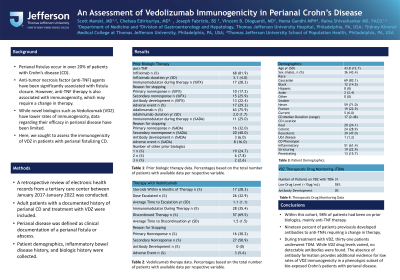Tuesday Poster Session
Category: IBD
P3553 - An Assessment of Vedolizumab Immunogenicity in Perianal Crohn’s Disease
Tuesday, October 24, 2023
10:30 AM - 4:00 PM PT
Location: Exhibit Hall

Has Audio

Scott Manski, MD
Thomas Jefferson University Hospital
Philadelphia, PA
Presenting Author(s)
Scott Manski, MD, Chelsea Edirisuriya, MD, Joseph Fabrizio, BS, Vincent Dioguardi, MD, Raina Shivashankar, MD, FACG
Thomas Jefferson University Hospital, Philadelphia, PA
Introduction: Perianal fistulas occur in over 20% of patients with Crohn’s disease (CD). Anti-tumor necrosis factor (anti-TNF) agents have been significantly associated with fistula closure. However, anti-TNF therapy is also associated with immunogenicity, which may require a change in therapy. While novel biologics such as Vedolizumab (VDZ) have lower rates of immunogenicity, data regarding their efficacy in perianal disease have been limited. Here, we sought to assess the immunogenicity of VDZ in patients with perianal fistulizing CD.
Methods: A retrospective review of electronic health records from a tertiary care center between January 2017-January 2022 was conducted. Adult patients with a documented history of perianal CD and treatment with VDZ were included. Perianal disease was defined as clinical documentation of a perianal fistula or abscess. Patient demographics, inflammatory bowel disease history, and biologic history were collected.
Results: We identified 83 patients with perianal CD who were treated with VDZ; 43% were male. Average age was 43.8 years (SD 12.7 yrs) and median CD duration was 17 years (range 2-48 yrs). Eighty-two percent of patients had been on prior infliximab (IFX) and 76% on prior adalimumab (ADA) therapy with an average duration of 3.2 years (SD 4.0). Therapy was discontinued due to antibody formation in 22.4% of IFX-treated patients and in 6% of ADA-treated patients. While on VDZ, 32.9% required dose escalation; 35% were also treated with an immunomodulator. Although several patients (31%) were continued on VDZ therapy, the most common indications for cessation were primary (30%) and secondary (51%) nonresponse. Three patients had adverse events leading to VDZ discontinuation; 1 developed hives during an infusion and 2 others experienced uncontrolled arthralgias. Thirty-one patients were documented to undergo VDZ therapeutic drug monitoring (TDM). While 55% had a low drug level (< 15μg/mL), none had detectable antibodies to VDZ.
Discussion: Within this cohort, 98% of patients had been on prior biologics, mainly anti-TNF therapy. Nineteen percent of patients previously developed antibodies to anti-TNFs requiring a change in therapy. During treatment with VDZ, thirty-five percent of patients underwent TDM. While VDZ drug levels varied, no detectable antibodies were found. The absence of antibody formation provides additional evidence for low rates of VDZ immunogenicity in a phenotypic subset of bio-exposed Crohn’s patients with perianal disease.
Disclosures:
Scott Manski, MD, Chelsea Edirisuriya, MD, Joseph Fabrizio, BS, Vincent Dioguardi, MD, Raina Shivashankar, MD, FACG. P3553 - An Assessment of Vedolizumab Immunogenicity in Perianal Crohn’s Disease, ACG 2023 Annual Scientific Meeting Abstracts. Vancouver, BC, Canada: American College of Gastroenterology.
Thomas Jefferson University Hospital, Philadelphia, PA
Introduction: Perianal fistulas occur in over 20% of patients with Crohn’s disease (CD). Anti-tumor necrosis factor (anti-TNF) agents have been significantly associated with fistula closure. However, anti-TNF therapy is also associated with immunogenicity, which may require a change in therapy. While novel biologics such as Vedolizumab (VDZ) have lower rates of immunogenicity, data regarding their efficacy in perianal disease have been limited. Here, we sought to assess the immunogenicity of VDZ in patients with perianal fistulizing CD.
Methods: A retrospective review of electronic health records from a tertiary care center between January 2017-January 2022 was conducted. Adult patients with a documented history of perianal CD and treatment with VDZ were included. Perianal disease was defined as clinical documentation of a perianal fistula or abscess. Patient demographics, inflammatory bowel disease history, and biologic history were collected.
Results: We identified 83 patients with perianal CD who were treated with VDZ; 43% were male. Average age was 43.8 years (SD 12.7 yrs) and median CD duration was 17 years (range 2-48 yrs). Eighty-two percent of patients had been on prior infliximab (IFX) and 76% on prior adalimumab (ADA) therapy with an average duration of 3.2 years (SD 4.0). Therapy was discontinued due to antibody formation in 22.4% of IFX-treated patients and in 6% of ADA-treated patients. While on VDZ, 32.9% required dose escalation; 35% were also treated with an immunomodulator. Although several patients (31%) were continued on VDZ therapy, the most common indications for cessation were primary (30%) and secondary (51%) nonresponse. Three patients had adverse events leading to VDZ discontinuation; 1 developed hives during an infusion and 2 others experienced uncontrolled arthralgias. Thirty-one patients were documented to undergo VDZ therapeutic drug monitoring (TDM). While 55% had a low drug level (< 15μg/mL), none had detectable antibodies to VDZ.
Discussion: Within this cohort, 98% of patients had been on prior biologics, mainly anti-TNF therapy. Nineteen percent of patients previously developed antibodies to anti-TNFs requiring a change in therapy. During treatment with VDZ, thirty-five percent of patients underwent TDM. While VDZ drug levels varied, no detectable antibodies were found. The absence of antibody formation provides additional evidence for low rates of VDZ immunogenicity in a phenotypic subset of bio-exposed Crohn’s patients with perianal disease.
Disclosures:
Scott Manski indicated no relevant financial relationships.
Chelsea Edirisuriya indicated no relevant financial relationships.
Joseph Fabrizio indicated no relevant financial relationships.
Vincent Dioguardi indicated no relevant financial relationships.
Raina Shivashankar: Abbvie – Grant/Research Support, Speakers Bureau. Bristol Meyers Squibb – Speakers Bureau. Janssen – Advisory Committee/Board Member, Grant/Research Support.
Scott Manski, MD, Chelsea Edirisuriya, MD, Joseph Fabrizio, BS, Vincent Dioguardi, MD, Raina Shivashankar, MD, FACG. P3553 - An Assessment of Vedolizumab Immunogenicity in Perianal Crohn’s Disease, ACG 2023 Annual Scientific Meeting Abstracts. Vancouver, BC, Canada: American College of Gastroenterology.
